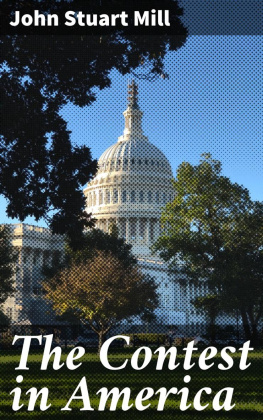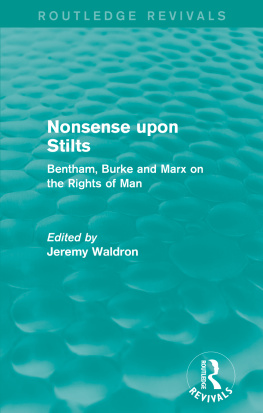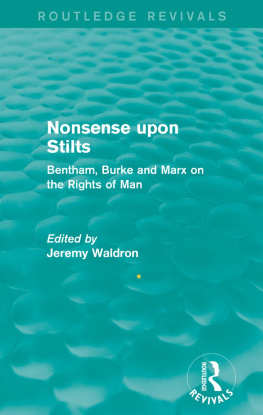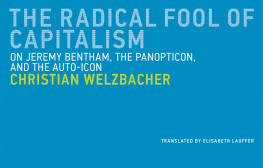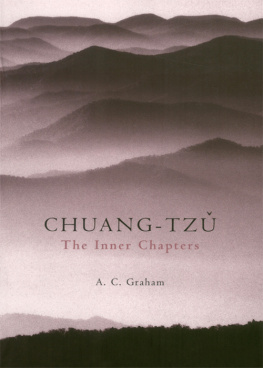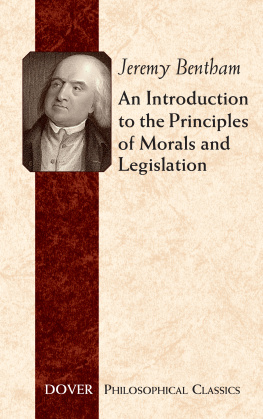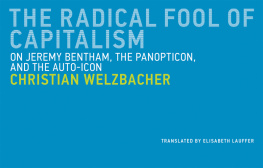Rethinking the Western Tradition
The volumes in this series
seek to address the present debate
over the Western tradition
by reprinting key works of
that tradition along with essays
that evaluate each text from
different perspectives.
EDITORIAL
COMMITTEE FOR
Rethinking the Western Tradition
David Bromwich
Yale University
Gerald Graff
University of Illinois at Chicago
Geoffrey Hartman
Yale University
Samuel Lipman
(deceased)
The New Criterion
Gary Saul Morson
Northwestern University
Jaroslav Pelikan
(deceased)
Yale University
Richard Rorty
(deceased)
Stanford University
Alan Ryan
Princeton University
Ian Shapiro
Yale University
Frank M. Turner
Yale University
Selected Writings
JEREMY BENTHAM
Edited and with an Introduction by
Stephen G. Engelmann
with essays by
Philip Schofield
David Lieberman
Jennifer Pitts
Mark Canuel
Yale
UNIVERSITY
PRESS
New Haven and London
Published with assistance from the foundation established in memory of
Philip Hamilton McMillan of the Class of 1894, Yale College.
Copyright 2011 by Yale University.
All rights reserved.
This book may not be reproduced, in whole or in part,
including illustrations, in any form (beyond that
copying permitted by Sections 107 and 108 of the U.S.
Copyright Law and except by reviewers for the public
press), without written permission from the publishers.
Yale University Press books may be purchased in quantity for educational,
business, or promotional use. For information, please e-mail sales.press@yale.edu
(U.S. office) or sales@yaleup.co.uk (U.K. office).
Set in Times Roman type by Keystone Typesetting, Inc.
Printed in the United States of America.
Library of Congress Cataloging-in-Publication Data
Bentham, Jeremy, 17481832.
[Selections. 2011]
Selected writings / Jeremy Bentham ; edited and with an introduction by
Stephen G. Engelmann ; with essays by Philip Schofield... [et al.].
p. cm. (Rethinking the Western tradition)
Includes index.
ISBN 978-0-300-11237-5 (pbk. : alk. paper)
1. Philosophy. I. Engelmann, Stephen G., 1961 II. Schofield, Philip, 1958 III. Title.
B1574.B31E54 2011
192dc22
2010017111
A catalogue record for this book is available from the British Library.
10 9 8 7 6 5 4 3 2 1
Contributors
Mark Canuel is Professor of English at the University of Illinois, Chicago.
David Lieberman is Jefferson E. Peyser Professor of Law, Jurisprudence and Social Policy Program, University of California, Berkeley.
Jennifer Pitts is Associate Professor of Political Science at the University of Chicago.
Philip Schofield is Professor of the History of Legal and Political Thought, Director of the Bentham Project, and General Editor of the Collected Works of Jeremy Bentham, University College London.
For Philip Schofield
and his colleagues at the
Bentham Project
Contents
Preface
It is difficult to do justice to the scope of Jeremy Benthams work in one volume. He simply wrote too much, and on too many things. What I have attempted here is to give a sense of the range of his thought and a sample of new critical commentary. A few of the texts I prepared for inclusion were subsequently dropped, to keep the size and cost of the book manageable. Readers who want to read more should consult The Collected Works of Jeremy Bentham (London and Oxford, 1968) as well as the less reliable but still indispensable Works of Jeremy Bentham (Edinburgh, 183843). Bentham wrote so many millions of words that some of his work remains virtually undiscovered or has been discovered and lost again; readers who crave still more can visit depositories of manuscripts, by far the biggest of which is the roughly sixty thousand sheets in University College Londons Bentham Collection at 140 Hampstead Road.
The editorial collective behind the new Collected Works is the Bentham Project of UCLs Faculty of Laws. Philip Schofield is the project director and general editor of the Collected Works. Because of his generous assistance, this book includes new Bentham: the opening treatise on sex has never been published, except for short excerpts as an appendix to C. K. Ogdens edition of Theory of Legislation (1931). Also, Place and Time has never appeared before now as reconstructed exclusively from Bentham manuscript (and fully annotated). Although definitive versions of these works will eventually appear in the Collected Works, Professor Schofield has used Bentham Project methods to produce faithful editions for this volume. We thank University College London Library for permission to publish from the Bentham Collection.
Most of the remaining material in this selection consists of texts either published in English under Benthams name during his lifetime or reproduced with permission from the new Collected Works (for exceptions to this rule, see the textual notes to Pannomial Fragments, Of Publicity, and the excerpt from Manual of Political Economy, respectively, pp. 240, 29192, and 308 below). Space constraints have been challenging, but I have tried not to rely too much on bits. And I have worked hard to avoid taking the path of other editors of Bentham readers, who make extensive use of John Bowrings Works. Nineteenth-century editorial conventions were different from our own: Bowrings Bentham is marred by scattered bowdlerizations and emendations; some of these come from simply retranslating into English the French texts of Benthams contemporary tienne Dumont, who was himself quite free with Benthams manuscripts. (Dumonts recensions, beginning with the Traits de Lgislation of 1802, were very successful and really made Benthams reputation, but they did so without much involvement from Bentham himself. In a characteristic letter to Dumont dated June 20, 1800, Bentham writes, I leave out for you seven packets of MSS. God knows what they contain.) I am grateful for the early permission of the Bentham Committee of University College London to make extensive use of the new Collected Works. But after struggling with Oxford University Press over licensing fees, I can see why so much that is published today under Benthams name consists of reprints of Bowring, however inadequate these might be. The monopoly privileges conferred by copyright were once granted according to a broadly republican and utilitarian rationale: a temporary period of private appropriation provided the incentive to produce more for a commonwealth of public use. Now, it seems, intellectual property has become ratified as a near natural right of publishers and other proprietors. I am thankful to Ben Kennedy of OUP for working to bring down the fees and to my university as well as Yale University Press for meeting them.
This project has had a huge amount of support from other sources as well, support without which I never could have completed it. An early sabbatical leave from the University of Illinois at Chicago and a summer stipend from the National Endowment for the Humanities were both essential. I also benefited from an award and a supplementary stipend from UICs Office of the Vice Chancellor for Research as well as additional travel support from my own household, for which I thank Sophia Mihic and Mia Engelmann, and from that of my parents, for which I am grateful to Mary Engelmann and to my late father, Fred. Dean Dwight McBride and the College of Liberal Arts and Sciences at UIC provided crucial late-stage research funding. The Special Collections library staff of University College London have been cheerful and helpful through several visits; thanks also to the British Library in London and UICs Daley Library in Chicago. I am particularly grateful for the hospitality of the Bentham Project and for consultations with several of its members. These individuals have given invaluable advice and encouragement, as have other denizens of a worldwide community of Bentham scholars from the United Kingdom, Canada, France, Germany, Italy, and Japan. The Department of Political Science at UIC was generous with research assistantships, and I am thankful to Clifford Deaton, John French, Vanessa Guridy, Wael Haboub, Nawojka Lesinski, Cosmina Menghes, Jason Stodolka, and Nora Willi for all their helpspecial thanks to Wael and John for pulling extra duty. Tommy Barnett, William Lee, Amanda Martin, and Dana Williams provided enthusiastic and capable undergraduate support (mostly through UICs Honors College), as did Mark Fisher, who volunteered while on break from his studies abroad. My colleague Allan Kershaw provided invaluable advice on Latin translation, and Sunil Agnani gave great annotation research advice. John Casey and Wendy Doniger responded cheerfully to last-minute queries. All remaining mistakes in this volumeand no doubt there are someare of course my responsibility alone.
Next page

